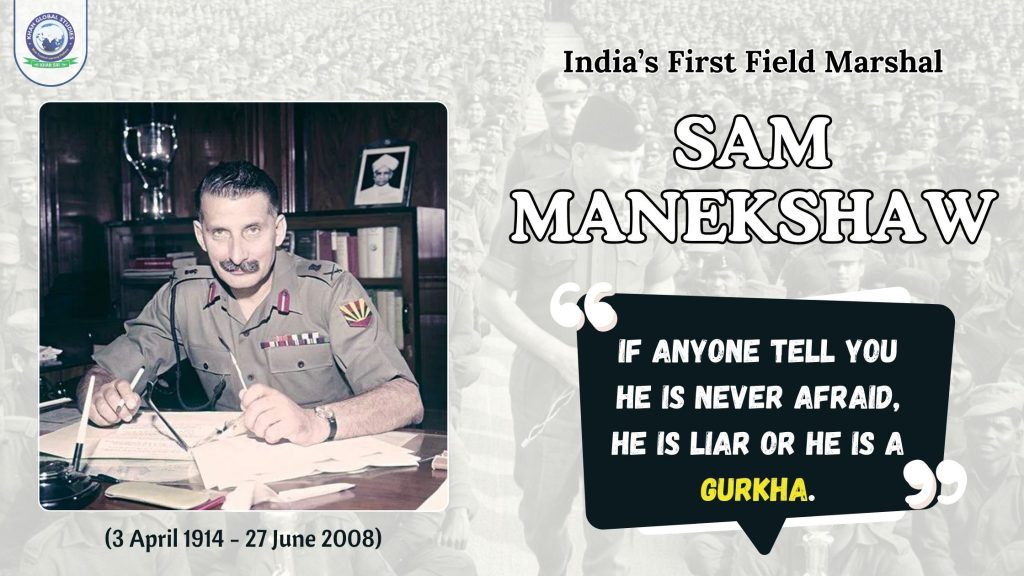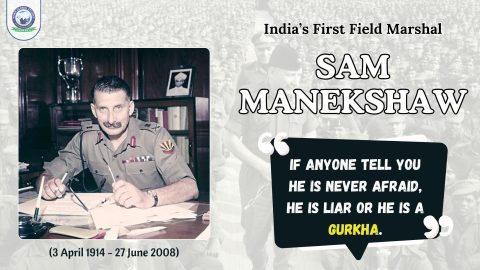Early Life and Childhood
Field Marshal Sam Hormusji Framji Jamshedji Manekshaw was born on April 3, 1914, in Amritsar, British India (now in Punjab, India). His father, Hormusji Manekshaw, was from the Parsi community and was a doctor by profession. His mother was Hirabai Manekshaw. From childhood, Sam was courageous and inquisitive. He was raised in a disciplined and educated family, which instilled in him qualities of leadership and dedication.
His father wanted him to pursue medical studies, but Sam aspired to join the army. Therefore, he enrolled in the Indian Military Academy (IMA), Dehradun. He completed his early education at Sherwood College, Nainital, where he excelled in both academics and sports. His military career began in 1932 when he became part of IMA’s first batch and graduated in 1934.
Military Career
- Entry into the British Indian Army: On February 1, 1935, Sam Manekshaw was commissioned into the 12th Frontier Force Regiment of the British Indian Army. His first posting was in Waziristan (now in Pakistan).
- Contribution to World War II: During World War II, he was sent to the battlefield in Burma (now Myanmar) to fight against the Japanese army. In 1942, during an operation in Burma, he was severely wounded after being shot multiple times. Despite his injuries, he continued to lead his post. Impressed by his bravery, Major General David Cowan promoted him immediately.
- Military Career After Independence: After India’s independence, he became a part of the Indian Army and played a crucial role in the reorganization of Indian forces during the partition. He demonstrated exceptional leadership skills in the India-Pakistan wars, the India-China war, and the 1971 war.
Role in India-Pakistan Wars
- 1947-48 War: During this war, Pakistan attacked Jammu and Kashmir. Sam Manekshaw played a significant role in securing victory for India. His war strategy and quick decision-making forced Pakistan to retreat.
- 1962 India-China War: During this war, he led the Indian Army in Arunachal Pradesh (then the North-East Frontier Agency). Although India suffered losses in this war, Sam Manekshaw maintained the morale of his soldiers. This war gave him valuable military experience.
- 1965 India-Pakistan War: During this war, he was the head of the Western Command and devised effective military strategies against Pakistan, giving India a strategic advantage. His war tactics ensured that India responded strongly to Pakistan.
- 1971 India-Pakistan War
- This war is remembered for his strategic brilliance. He led the Indian Army effectively, forcing more than 90,000 Pakistani soldiers to surrender. As a result of this war, Bangladesh became an independent nation.
- He famously assured Prime Minister Indira Gandhi, saying, “I guarantee you 100% victory,” and he fulfilled his promise.
His War Strategies
- Precise Planning: He analyzed all possible outcomes before the war and devised the right strategy.
- Boosting Soldiers’ Morale: He always motivated his troops and understood their needs.
- Exploiting Enemy Weaknesses: He identified Pakistan’s weaknesses and planned attacks accordingly.
- Diplomatic Understanding: He not only relied on military strength but also considered political scenarios before making decisions.
Important Ranks and Postings
Throughout his military career, Sam Manekshaw held several key positions:
- 1935 – Second Lieutenant, British Indian Army
- 1942 – Major, Promoted for bravery during World War II
- 1947 – Lieutenant Colonel, Assigned new responsibilities after India’s partition
- 1952 – Brigadier, Contributed to military planning and administration
- 1961 – Major General, Played a crucial role in defense policy and war strategy
- 1964 – Lieutenant General, Led the Western Command of the Indian Army
- 1969 – Chief of Army Staff, Highest rank in the Indian Army
- 1973 – Field Marshal, First person in India to receive this highest military honor
Field Marshal Rank
In 1973, he was honored as India’s first Field Marshal, the highest rank in the Indian Army. This rank is given only to military leaders who achieve historic victories. His military career spanned five decades, making him one of India’s most distinguished generals.
Awards and Honors
For his bravery and exceptional leadership, Sam Manekshaw received several national and international honors:
- Padma Bhushan (1968)
- Padma Vibhushan (1972)
- Order of the British Empire (Awarded by the British Government)
- Special Military Honors from the Government of India
- Various military medals and commendations
Personal Life
Sam Manekshaw led a simple and disciplined personal life. He was married to Silloo Manekshaw, and they had two children – Sheryll and Maja. He was a loving father and husband who preferred a peaceful life with his family.
After retirement, he settled in Wellington, Tamil Nadu, where he lived a quiet life. He was known for his humility and never compromised on his principles.
Famous Quotes and Sayings
Sam Manekshaw was known for his straightforwardness and bold statements. Some of his famous quotes are:
- “If a man says he is not afraid of dying, he is either lying or he is a Gurkha.”
- “I have a very fine army to defend India; I don’t need to be dragged into politics.”
- “A soldier’s greatest strength is his confidence and courage.”
Death
On June 27, 2008, Sam Manekshaw passed away in Wellington, Tamil Nadu, at the age of 94. His death caused widespread mourning across the country. Although he was not given a state funeral, the Indian Army honored him with full military honors. His contributions will always be remembered, and he remains immortal in Indian military history.
Conclusion
Sam Manekshaw was not only an exceptional general but also an inspiring leader. His strategies, leadership, and discipline took the Indian Army to new heights. His life symbolizes dedication, courage, and patriotism. He was a military officer who upheld his ideals not just on the battlefield but throughout his life.
His leadership and strategic brilliance played a crucial role in India’s historic victory over Pakistan in the 1971 war. His life teaches us that true leadership is not just about power but also about vision, decision-making ability, and foresight.
His contributions will never be forgotten, and his name will always be remembered with great respect in the Indian Army.





